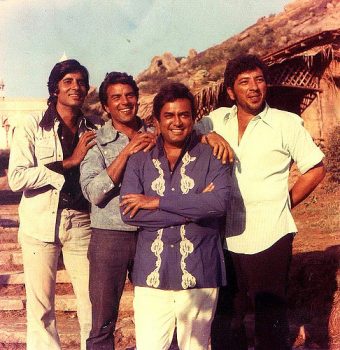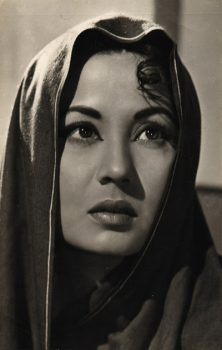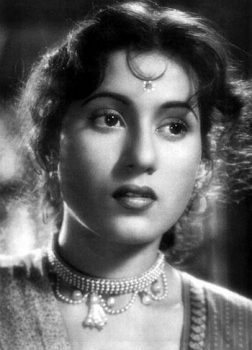I am Human, Just Like You (Main Insaan Hun, Tumhaari Tarah) Posted by Rachael on Jan 29, 2017 in Hindi Language, Uncategorized
Following the events of this week, I thought it would be relevant to share a song that celebrates unity and peace. This song, entitled “जानेवालो ज़रा, मुड़के देखो मुझे/Jaanevalo Zara Mudke Dekho Mujhe” (Passersby, Just Turn and Look at Me) is from the 1964 movie, दोस्ती/Dosti (fem. noun, friendship). The film centers on the close friendship between two young men: Ramu, a crippled boy who dreams of one day finding the means to resume his studies and a blind boy named Mohan. When it was released in 1964, the film was one of the ten highest grossing films of the year and was declared a “Super Hit”; it was also entered in the 4th Moscow Film Festival.
Both of the young men, who are abandoned by their families due to their disabilities and thus outcastes from society, find each other and realize they can earn money from singing and playing music on the street. Ramu, a skilled harmonica player, plays music in the background while Mohan fills the air with his powerful and expressive voice; through the money Mohan makes by singing on the street, he is able to pay for Ramu’s school admission and test fees on several occasions.
The song that follows is sung by Mohammed Rafi (मोहम्मद रफ़ी), whom I mentioned in a previous post about playback singers. Rafi Sahab (रफ़ी साहब, saahab is a word that frequently follows a Muslim male’s first or last name and denotes respect; it is also used sometimes as a general form of address regardless of religious affiliation) was a Muslim singer in a country that was and still is majority Hindu. In fact, according to the CIA World Factbook, currently 79.8% of the country’s population is Hindu, while 14.2% are Muslim. Yet, due to Rafi Sahab’s extraordinary talent and savvy, he thrived in a film industry that, both then and now, is also majority Hindu. As a religious minority, Rafi undoubtedly faced numerous obstacles in his desire to rise to the ranks of one of the greatest playback singers of India’s history. But, unlike Muslim actors and actresses of the day, he worked mostly behind the scenes, so he did not experience as much pressure to conform to the majority culture. Dissimilarly, Muslim actors such as Dilip Kumar (born Mohammed Yusoof Khan), Meena Kumari (born Mahjabeen Bano) and Madhubala (born Mumtaz Jehan Dehlavi) were often compelled to change their names to those that were more “Hindu-sounding” in order to be more successful in a film industry and country in which Muslims were often discriminated against. Although it is indeed true that most actors and actresses change their real names to “stage names” once they begin to pursue a career in film in earnest, the fact that such Muslim actors often changed their names to ostensibly Hindu rather than Muslim names is significant.
Like the film in which it appears, which celebrates the friendship between two unlikely heroes and thus emphasizes their humanity, courage and fortitude above all else, this song reminds us to embrace the common humanity of those around us, no matter the superficial differences that exist between us.
Here are the lyrics to the song, complete with an English translation and explanations where needed:
Jaane walon zara, mudke dekho mujhe.
जानेवालो ज़रा, मुड़के देखो मुझे ।
Passersby, just turn and look at me.
Ek insaan hun, main tumhaari tarah.
एक इंसान हूँ, मैं तुम्हारी तरह ।
I’m a human being, (I’m) like you.
Jisne sab ko racha, apne hi roop se,
जिसने सब को रचा, अपने ही रूप से,
The One* who created everyone in his own form,
*most likely refers to Brahma, the God of Creation in Hinduism.
Uski pehechaan hun, main tumhaari tarah.
उसकी पहचान हूँ, मैं तुम्हारी तरह ।
I am a symbol of him, (I’m) like you.
*(पहचान/pehechaan, fem. noun, can also mean identity).
Is anokhe jagat ki main taqadir hun.
इस अनोखे जगत की मैं तक़दीर हूँ ।
I am the destiny of this extraordinary world (or universe).
Main vidhaata ke haathon ki tasvir hun.
मैं विधाता के हाथों की तस्वीर हूँ ।
I am a painting from the hands of the Creator (Brahma or the Supreme Being).
Is jahaan ke liye, dharti maa ke liye
इस जहाँ के लिए, धरती माँ के लिए,
For this world, for Mother Earth,
Shiv ka vardaan hun, main tumhaari tarah.
शिव का वरदान हूँ, मैं तुम्हारी तरह ।
I am a boon of Shiva*, (I’m) like you.
*refers to another major god in Hinduism.
Man ke andar chipaaye milan ki lagan.
मन के अंदर छिपाए मिलन की लगन ।
There is a longing to unite* hidden inside my heart.
*this can mean both a desire to unite with fellow human beings as well as a desire to unite with his creator and thus escape the cycle of suffering known as “samsara” (the cycle of rebirth and redeath).
Apne suraj se hun ek bichhadi kiran.
अपने सूरज से हूँ एक बिछड़ी किरण ।
I am a beam of light separated from my sun.
Phir raha hun bhatakata, main yahaan se vahaan
फिर रहा हूँ भटकता, मैं यहाँ से वहाँ,
Still, I keep wandering, here and there (lit. from here to there),
Aur pareshaan hun, main tumhaari tarah.
और परेशान हूँ, मैं तुम्हारी तरह ।
And I am troubled, (I’m) like you.
Mere paas aao chhodo yah saara bharam.
मेरे पास आओ छोड़ो यह सारा भरम ।
Come close to me and abandon all of (your) illusions.
Jo mera dukh vahi hai tumhaara bhi gham
जो मेरा दुख वही है तुम्हारा भी ग़म,
My sadness is your sorrow too.
Dekhta hun tumhe, jaanta hun tumhe,
देखता हूँ तुम्हें, जानता हूँ तुम्हें,
I look at you, (and) I know you,
Laakh anjaan hun, main tumhaari tarah.
लाख अन्जान हूँ, मैं तुम्हारी तरह ।
I am a complete stranger, I’m like you.
*अन्जान/anjaan can also mean “ignorant.” This line could also mean that the singer is completely “ignorant”; as in, like the people who usually ignore him as a common street beggar but who are now listening to him in rapt attention because of his beautiful voice, he too is “unenlightened” or has not escaped the “maya” (or illusions) of worldly existence.
शब्दावली की सूची/Shabdaavali ki Soochi (Vocabulary List):
- दोस्ती/dosti (fem. noun): friendship.
- मुड़ना/murnaa (verb): to turn.
- इंसान/insaan (masc. noun): human being.
- रचना/rachnaa (verb): to create.
- रुप/roop (masc. noun): form.
- पहचान/pehechaan (fem. noun): identity, sign (or symbol).
- अनोखा/anokhaa (adjective): strange, extraordinary, unique.
- जगत/jagat (masc. noun): world, universe.
- तस्वीर/tasveer (fem. noun): picture, painting.
- धरती/dhartee (fem. noun): the earth, soil.
- छिपाना/chipaanaa (verb): to hide something.
- सूरज/sooraj (masc. noun): sun.
- परेशान/pareshaan (adjective): troubled, worried.
- दुख/dukh and ग़म/gam (masc. nouns): sorrow or sadness. Essentially the same word, except that the former is from Sanskrit and the latter is from Persian.
- अन्जान/anjaan (masc. noun and adjective): stranger, ignorant.

Build vocabulary, practice pronunciation, and more with Transparent Language Online. Available anytime, anywhere, on any device.








Comments:
~A:
Thanks for this! Really helpful to have the cultural/religious meaning included in the translation.
Rachael:
@~A Hi! Thanks for reading. मैं बहुत खुश हूँ कि आपको पसंद आया 🙂